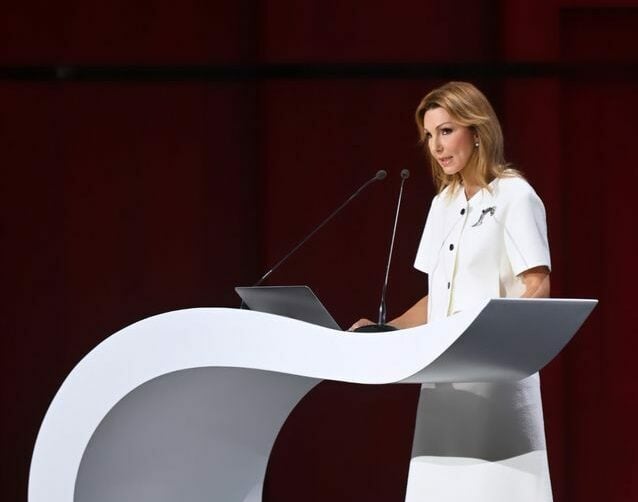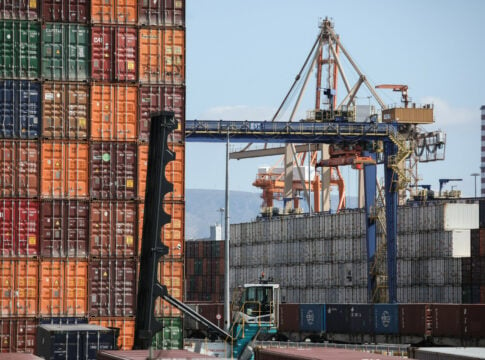The economic and social footprint of Greek shipping, both in Greece and in the global community, is described in an interview with “Naftemporiki” by the President of the Union of Greek Shipowners, Melina Travlou.
Greek shipowners are leading the way with their investments in the green transition of the sector at a global level, in the Greek economy, while their social contribution has also exceeded any precedent.
Travlou reported to “Naftemporiki” that “Greek shipowners are constantly investing in new, more energy-efficient ships, which incorporate a multitude of solutions at the level of high-tech environmental equipment. It is worth noting that our fleet is already the largest with the ability to use existing alternative fuels in the world.”
“Many members of the Greek shipping community also invest in other vital business sectors, from new technologies to real estate and tourism, contributing to Greece’s economic growth. It is clear, therefore, that the economic and investment contribution of our sector is very important and extends to many levels.”
The shipping industry faces new major challenges, after the pandemic, focused on the conflicts in Ukraine and the Middle East. How much do these developments affect the shipping industry?
“Shipping unites the peoples, the whole earth, therefore crises – and even geopolitical ones – of such intensity drastically affect the sector. Especially when they are connected both to the restriction of freedom of navigation, and to incidents of attacks against commercial ships, as we are experiencing in this period. The safety of our people at sea is a code of values, an inviolable law, a guide for all of us. Ensuring free navigation is also a necessary condition for smooth operation of maritime trade and the protection of the well-being of the world’s citizens.
At the same time, we have proven over time that shipping, and especially Greek shipping, adapts quickly and efficiently and we continue to offer our services reliably, under any conditions.
Thus, over the years, shipping is the one that provides the solution even to the most unfavorable circumstances and demanding challenges. In the global and unprecedented crisis of the Covid-19 pandemic, when the whole world had stopped moving, ships continued to transport essential goods, medicines and health equipment around the world, contributing substantially to the survival of humanity.”
The industry is also facing the great challenge of the green transition. You have stated that a universal and feasible message is needed that will not jeopardize the safety of navigation. Was the message received?
“Universal, feasible solutions are not just the message of shipping, they are shipping itself, its existence. I believe and it seems in practice that the special characteristics of the sector and in relation to its green transition, are becoming more and more understandable, therefore perceived.
This fact contributes decisively to the formation of the navigation plan that we need to follow in the coming years. Here I would like to mention that, first of all, we now have a clear and common goal for our energy transition in the next 25 to 30 years from now. It is extremely beneficial that, globally, our member states in the International Maritime Organization have agreed to net zero greenhouse gas emissions from shipping.
The issue now is for the international community to determine the measures that can make this ambitious, but under certain conditions feasible goal, a reality. Therefore, not only has the message been received, but we are working together as an international shipping community to find realistic proposals to achieve our common goal and ensure the sustainability of shipping on a sustainable planet.”
The Greek fleet is proceeding to investments in ships with green features or alternative fuels. Many companies also have ongoing programs for green fuels and alternative technologies. Therefore, Greek shipping respects its commitments. Have the other links in the chain followed at the same speed?
“It is a fact that Greek shipping is at the forefront of the sector’s green transition. Greek shipowners are constantly investing in new, more energy-efficient ships, which incorporate a multitude of high-tech environmental equipment solutions. It is worth noting that our fleet is already the largest with the ability to use existing alternative fuels in the world. But in any case, we emphasize that we remain technologically neutral in relation to what will be the new low- or zero-emission alternative fuels to be used by our ships that will be built in the future.
As far as the existing fleet is concerned, it is necessary to develop alternative fuels compatible with the existing engines of the ships, drop-in fuels. At the same time, however, the energy efficiency of our fleet will improve with the use of new applicable technological solutions, such as carbon captures on our ships.
In any case, there is a tripartite that new technologies and especially alternative fuels must fulfill in order to effectively contribute to the energy transition of our industry.
Firstly, to be available in sufficient quantities worldwide, secondly, to be affordable – that is, to reduce gradually and as much as possible the difference in their price with conventional fossil fuels. Thirdly and most importantly, they should be safe for our ships and much more so for our people at sea and of course for the protection of the environment. All this, of course, requires the immediate mobilization and action of other sectors connected to shipping, in particular the producers and suppliers of fuel, the shipyards, the manufacturers of engines and general shipping equipment. From our side, we are ready to practically support the new technologies that will meet these three criteria, as we have proved with our systematic investments so far.”














